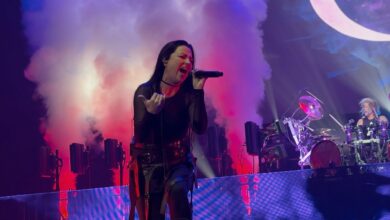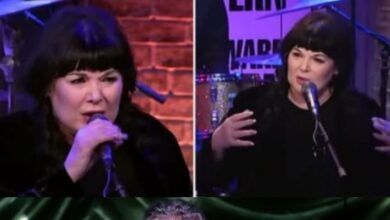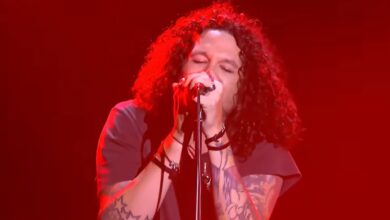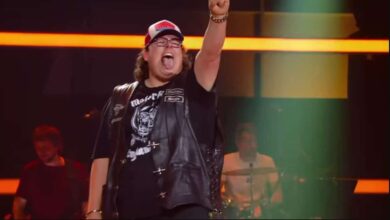Ann Wilson Proves Rock Immortality with a Fiery “Barracuda” Performance on The Howard Stern Show
An early spring morning set the stage in the Stern studio, the usual chaos paused as Ann and Nancy took their places with Heart. The cameras were ready; the microphones stood polished and low. For a band so accustomed to arenas, the intimate setting felt different—but electrified. It marked their first major appearance tied to their current tour, a moment heavy with legacy, resurgence, and that unmistakable rock-and-roll grit.
Before the riff struck, Howard engaged them in conversation, peeling back decades of stories. There were tales of club days, opening for Rod Stewart, the industry maneuvering, and the sexist rumors that sparked the fire behind the song. Recalling how that anger shaped the performance gave fans a new lens for the upcoming moment.
What made the appearance shine was its relevance to Heart’s modern moment. They weren’t just revisiting past glories—they were actively touring, recording, and performing with purpose. The studio setting didn’t diminish the energy; if anything, it concentrated it into something sharper, immediate, and potent.
Visually, the band stood tall in the compact space: Nancy at her guitar renowned for its galloping riff, Ann at the mic channeling decades of experience and emotion. In the small room, the rock-legend aura didn’t fade—it magnified. No pyrotechnics, no huge stage, just raw presence and undeniable skill.
From the opening chord, the performance demanded attention. Nancy launched into that iconic riff with absolute authority, the pattern heavy and urgent. In that studio, every nuance stood out—the rhythm, the dynamics, the subtle shifts—giving the impression that Heart was stripping the song down to its bare bones and rebuilding it in front of the audience.
Then Ann’s voice soared. Strong, precise, fierce. She knew this wasn’t just a song she’d sung for years—it was an anthem she still lived. Her vocal leaps, the snarling phrases, the sustained notes all landed with the same force they would have in a stadium. Her presence was magnetic; you could feel the room shift.
The emotional current in the performance was as clear as the technical mastery. The song had been born as a response to disrespect and manipulation, and now the band played it with that same fire—only tempered by decades of experience. There was a swagger to the anger, a sense that the band had emerged victorious and were now reclaiming the narrative on their own terms.
Because the cameras were close and the room unfiltered, small moments shone. The glances between Ann and Nancy as they moved into the chorus, the subtle confidence in the rhythm section, the tightness of the band. You didn’t just watch the performance—you felt it. That’s what drove the clip’s viral spread later.
The arrangement stayed true to the original but evolved. The groove had a modern punch, the guitar tone wasn’t dated, the tempo perhaps leaned subtly heavier. This wasn’t a revival—it was renewal. Nancy’s leads, while instantly recognizable, bore little hints of change: fresh fills, bolder tones, tighter interplay.
Underneath the performance flows a meaningful narrative. The story of the song’s creation—born of sexism, rumors, frustration—is still audible in every chord. Seeing the Wilson sisters mid-career, still dominating and still passionate, performing that same song with sharpness and vigor, it feels like a long game finally winning its moment.
For fans (old and new) the clip became more than a performance—it was a touchpoint. Ann’s voice still commanding. Nancy’s stage presence still magnetic. The band still hungry. In an era where many classic acts go through the motions, Heart felt unapologetically alive, demanding attention and respect.
It also opened a doorway for younger listeners. In that studio, the performance served as a bridge: the song’s origins in the 70s, the band’s evolution, the current tour, and the timelessness of the craft. You could imagine someone discovering the video, scratching through to the full catalogue, and rediscovering what made Heart such an essential rock band.
On a larger scale, the appearance affirmed how rare and vital Heart’s story is. Women fronting major hard-rock bands was once almost unheard of; here they are decades later, still standing tall, still performing with maximum conviction. Every time that riff kicks in, it’s a reminder: they broke down doors and kept them down.
By the time the last note faded, the performance left more than a mark—it delivered an experience. What began as a radio studio set became a stage carrying decades of ambition, struggle, triumph, and artistry. Heart didn’t just revisit “Barracuda”; they reaffirmed that the song, and they themselves, still matter.





